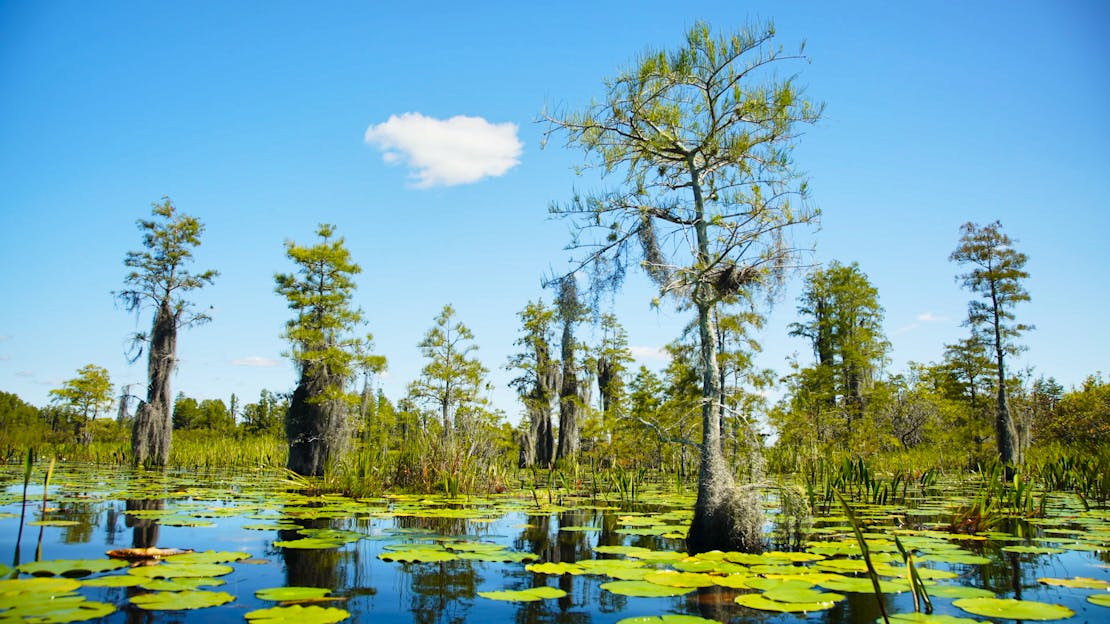Tweet“This is a watershed moment for the Okefenokee. The science is clear and the broad opposition from state legislators, FWS officials and local communities is deafening. It is time to finally protect this biodiverse wetland from reckless mining once and for all.”
Today, Georgia’s Environmental Protection Division opened a 60-day comment period on Twin Pines Minerals’ application to mine near the Okefenokee Swamp. Twin Pines has been seeking permission to break ground on the first phase of a long-term operation that will eventually consume roughly 6,000 football fields’ worth of land next to Okefenokee, North America’s largest blackwater swamp.
“This is a watershed moment for the Okefenokee. The science is clear and the broad opposition from state legislators, FWS officials and local communities is deafening,” said Christian Hunt, senior federal lands policy analyst with Defenders of Wildlife. “It is time to finally protect this biodiverse wetland from reckless mining once and for all.”
Support to protect the Okefenokee prior to this comment period has been resounding, with more than 100,000 signed comments at the state and federal level. Notably, U.S. Secretary of the Interior Debra Haaland recently submitted comments directly to Georgia’s Governor Kemp that reinforced the dangers of mining operations near the Okefenokee Swamp and urged him to not support this proposal.
The Twin Pines strip mine would eventually destroy nearly 8,000 acres of land within 400 feet of Okefenokee, including the unique soil profile of the Trail Ridge. The pumping of groundwater from the swamp’s edge could drastically undermine the Okefenokee’s ability to sustain itself, according to the U.S. Fish and Wildlife Service. For the alligators, salamanders and wading birds—such as the threatened wood stork—which depend on predictable, seasonal fluctuations in water levels, the results could be catastrophic.
Background:
- The Okefenokee National Wildlife Refuge is a vital natural resource in Georgia and the largest refuge east of the Mississippi. At roughly half a million acres, the Okefenokee is one of the largest intact freshwater ecosystems in the world and home to various threatened and endangered species. The refuge also contains more than 350,000 acres of congressionally designated wilderness that supports hundreds of species of plants and animals, including the imperiled red-cockaded woodpecker and eastern indigo snake.
- Of the nearly 600 refuges in the National Wildlife Refuge System, the Okefenokee is in the top ten for economic output, generating $64 million per year for local communities, and supporting over 750 jobs.
- The Twin Pines proposal has provoked a significant outcry. In 2021, a bipartisan group of Georgia and former federal officials signed an open letter criticizing the project in the Atlanta Journal-Constitution.
Help protect Okefenokee by signing our petition today!
For over 75 years, Defenders of Wildlife has remained dedicated to protecting all native animals and plants in their natural communities. With a nationwide network of nearly 2.1 million members and supporters, Defenders of Wildlife is a leading advocate for innovative solutions to safeguard our wildlife for generations to come. To learn more, please visit https://defenders.org/newsroom or follow us on X @Defenders.
Media Contact
News

Study Led by Defenders of Wildlife Scientist Shows Noise Pollution Impacts on Migratory Birds



